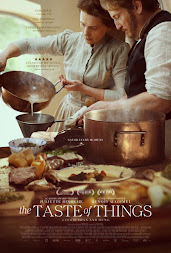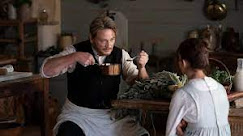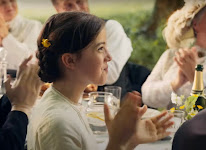Alternately, if you value rapturously gorgeous cinematography, in this case of 19th century interiors, bounteous gardens, a beguiling countryside and, yes, culinary arts, OR if you are simply a romantic at heart - The Taste of Things may be for you, as well.
What is it about? Here’s my paraphrased and embellished version of the official plot description:
 Set in France in 1889, peerless cook Eugénie (Binoche) has worked for the celebrated gastronome Dodin-Boufant (Magimel) for the last 20 years. Dodin’s renown is so great, he is known as The Napoleon of gourmets and The Shakespeare of the table. At the same time, Eugénie’s talent, under Dodin’s tutelage, has given rise to dishes, one more delicious than the next, that confound even the world’s most illustrious chefs. She is more than a cook, she is a genius, an artist of cuisine – as Dodin and his friends freely acknowledge. In fact, Eugénie is as well-known and admired among the cognoscenti as Dodin.
Set in France in 1889, peerless cook Eugénie (Binoche) has worked for the celebrated gastronome Dodin-Boufant (Magimel) for the last 20 years. Dodin’s renown is so great, he is known as The Napoleon of gourmets and The Shakespeare of the table. At the same time, Eugénie’s talent, under Dodin’s tutelage, has given rise to dishes, one more delicious than the next, that confound even the world’s most illustrious chefs. She is more than a cook, she is a genius, an artist of cuisine – as Dodin and his friends freely acknowledge. In fact, Eugénie is as well-known and admired among the cognoscenti as Dodin.
The two have become increasingly close over the years; and by the time of The Taste of Things the master/servant relationship has evolved into a professional partnership and what's more - it has become a romance (even as Eugénie’s room in Dodin’s manse remains up in the servants’ quarters). Despite Dodin’s repeated entreaties, Eugénie has never agreed to marry him; she’s proud and more than satisfied with her position, preferring the freedom of the status quo to the possible subordination of marriage. Faced with her reluctance, Dodin decides to do something he has never done before: he’ll cook for her.
The film opens with Eugénie roving the splendid garden, looking for the best lettuces (or are they cabbages?) – a contented half-smile on her face. Pretty soon, though, we are in the kitchen, a lovely, spacious place in a large 18th or 19th century country house. An elaborate, multicourse meal is busily being prepared. Dodin, the master of the house, is there along with Eugénie, assisted by two young servant girls Violette, who is perhaps 16 or 17, and ten-year-old prodigy Pauline. With balletic fluidity, the camera effortlessly glides in and around the sun-lit room with these people, following the ingredients they are carrying – olive oil; jugs of water; plates with various meats, shellfish, and whole fish; bowls of chopped assorted vegetables and herbs; carafes of wine, cognac, or whatever - to be added to the many simmering, sizzling and steaming pots, bright copper all. The cinematography of the meal preparation is so exquisite and, well, delicious, that we lose all track of time observing the proceedings, broken up only by a few cuts to Dodin’s four sybarite friends sitting in the dining room upstairs, anticipating the culinary delights soon to be arriving. We watch as each course is completed, plated and served. Watching all this after a rather ample dinner myself, and not at all hungry, I began salivating anyway – it all looked so ravishingly delectable. My feelings were only amplified as each dish was served in turn to Dodin and his four guests, Taking the first bite, one after the oither would slowly smile with appreciation and delight, or shake his head in disbelief, or roll his eyes with happiness and wonder.The scene I’ve just described lasts about thirty-five minutes – more than a quarter of the movie’s run time, during which there is very little dialogue – other than kitchen talk. And yet, it was all so pleasurable that I found it completely captivating. Only after the table has thus been set do we get to know and understand the characters, and does their story begin to unfold.
The culture and artistry of fine food being so central to the lives of all concerned, there is a fair amount of cooking and eating involved even then. (Ah, but what food!). But now there is also the frisson of a mid-life romance, as only the French can pull it off. Indeed, the sense I have is that Tranh here is suggesting that exquisite food and exquisite love are all of a piece - emotional, sensual, ephemeral. I certainly found it affecting in this way.Here is one moment, for example, that touched my heart late in the film, when Dodin and Eugénie sit down to sup together - just the two of them and just a simple meal in the kitchen – when he says to her, “This is the best moment of the day”. It is an uncomplicated statement, yet clearly his words refer not just to this meal or this day, encompassing instead the entirety of their life together - their shared passion for and commitment to the the art of food, and their connection each to the other, which is the deepest satisfaction of his life.
On the strength of The Taste of Things, I went back and watched Anh Hung Tran’s first feature film from slow thirty years ago, The Scent of Green Papaya. That film , set largely in 1951, also has an unhurried, dreamy feel to it, and like this one, relies on observant, beautifully rendered camera work to place us in a time, place and environment that is as important as the plot. It’s the story of a servant girl in colonial Viet Nam (Indochina, as it was then known). [If you haven’t seen that one, it’s available for free to members of Kanopy, or to rent from Amazon, Vudu and others.]
I started this review suggesting that a love of cooking and/or fine food was some sort of prerequisite to your enjoyment of The Taste of Things. I take that back. It’s simply a very lovely, charming picture. Highly recommended - and not just by me. The film rates a high critical score of 83 on the review aggregator Metacritic.com and an even higher consensus score of 99% on RottenTomatoes.com. Those who are more into fast moving, plot-driven movies, may find The Taste of Things too slow. I’d encourage all my other readers to check it out2 hours 15 minutes In French with English subtitles.
Grade: A-
Opens theatrically February 9, 2024, likely a rolling release to select theaters. For more specific information about venues check HERE.






No comments:
Post a Comment